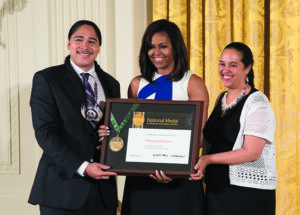Overview
The Tomaquag Museum, Exeter, RI • tomaquagmuseum.org • Ongoing

The Tomaquag Museum is located in a white farmhouse-style building nestled in the woods of Arcadia Village in Exeter, Rhode Island. Founded in 1958 by Princess Red Wing, a Narragansett-and-Wampanoag historian, and the anthropologist Eva Butler, the Museum is dedicated to Indigenous culture and history, with a particular focus on the communities of southern New England—including the Narragansett people, the only federally-recognized tribe in Rhode Island. In 2016, the Museum received the National Medal for Museum and Library Service (a framed photograph of Michelle Obama presenting the award to board member Christian Hopkins and the museum’s executive director Lorén Spears sits on a table by the entrance).
The name “Tomaquag” comes from the Narragansett word for “beavers,” an appropriate name for an organization that presents the concept of indigeneity as part of a complex and interconnected system. Within the interior gallery space, different displays engage with various aspects of social life—such as food, clothing, and trade—which are intertwined with the region’s natural resources, emphasizing the harmony between culture and nature. Additionally, the museum showcases the rich cultural production of southern New England communities through displays of intricately-woven basketry, pottery, historical and modern regalia, and an array of ornate beadwork pieces. Exhibits also highlight the Indigenous history of the region by featuring the lives and achievements of prominent figures and leaders from Rhode Island.
Objects on display are referred to as “belongings,” underlining their personal and human connections. The museum staff excel at contextualizing these belongings within Indigenous culture, effectively bridging historical narratives with contemporary matters. This emphasis on Indigenous voices is a distinctive feature of the Tomaquag Museum. Through first-person accounts, community members can share their memories and experiences, giving them control over their own history. Moreover, the museum highlights current Indigenous artistic and cultural production in New England by promoting the works of contemporary artists and hosting storytellers and speakers.
The Tomaquag Museum plans to relocate to a new site on the University of Rhode Island campus in Kingston in the near future. The new facility will enhance the museum’s capacity to engage and connect with the public and serve as a hub for research. This expansion will also ensure that the Tomaquag Museum continues its vital role in preserving and celebrating Indigenous heritage in New England.
— Michael W. Zhang
